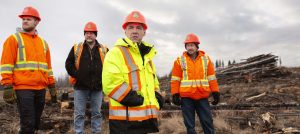
Left to Right: Daniel Persson, Forestry Superintendent with Central Chilcotin Rehabilitation, Joe Webster, Manager with Tŝideldel Biomass, Philippe Theriault, General Manager with Tŝideldel Enterprises, and Steve Kozuki with the Forest Enhancement Society of BC.
KAMLOOPS – The Forest Enhancement Society of BC (FESBC) Accomplishments Update provides an insightful overview of the forest enhancement work accomplished in the past year. At the Truck Logger’s Association convention in January of 2023, Premier David Eby announced that FESBC would be entrusted with administering $50 million for forest enhancement projects, focusing on waste wood utilization and wildfire risk reduction.
In response to the Premier’s announcement, FESBC quickly rolled out a funding intake for First Nations, community forests, companies, and communities throughout the province. Project approvals commenced soon after that. Now, just one year after the initial announcement, FESBC is excited to report the cumulative approvals of 66 projects valued at $47.9 million, with work on those projects actively underway. FESBC is particularly proud that 39 of these projects are led by or involve First Nations, reflecting the collaboration and the importance of First Nations involvement at the core of FESBC’s initiatives.
“The Forest Enhancement Society of BC (FESBC) supports First Nations, community forests, rural communities, and many others who take on projects to help strengthen forest health and ecosystems while creating good jobs in communities across the province,” said Minister of Forests, Bruce Ralston. “As we look ahead to a new year, it’s vital we build on the lessons learned in 2023, specifically following the worst wildfire season in our province’s history. With the help of the 66 projects funded in 2023, B.C. is taking necessary steps in battling climate change and becoming more resilient in the face of worsening wildfire seasons. Thank you to the entire team at FESBC for a job well done.”
Featured in the Accomplishments Update are three projects showing the positive impacts of FESBC-funded initiatives focused on waste wood utilization and wildfire risk reduction. These projects also created broader benefits such as improved wildlife habitat, additional recreational opportunities on the landbase, job creation in the forestry sector, and improvement to the overall health of B.C.’s forests.
“Healthy forests are essential to thriving and diverse ecosystems that support healthy people, secure communities along with a sustainable B.C. economy,” said George Heyman, Minister of Environment and Climate Change Strategy. “They also have a key role in address climate change impacts, given their ability to absorb and store large amounts of carbon from the atmosphere. We are proud to work with FESBC, First Nations, and local communities to strengthen forest stewardship so forests, watersheds and our communities are more resilient to the changing climate.”
One such project is happening in the 70 Mile House area in the Cariboo Region of the province, led by the Central Chilcotin Rehabilitation Ltd. (CCR), a joint venture of the Tŝideldel (read: Sigh Dell Dell) First Nation and the Tl’etinqox (read: Te Tin Co) Government.
“Over the last four years, close to one million cubic metres [17,000 logging trucks] of fibre has been recovered in our region,” shared Percy Guichon, Executive Director of CCR. “Much of the recovery work was supported with funding from FESBC’s fibre utilization program.”
FESBC’s Executive Director, Steve Kozuki, said, “We are very proud of the project partners in local areas all around British Columbia who have stepped forward with creative and thoughtful projects which not only utilize more waste wood or reduce wildfire risk but also drive additional benefits. FESBC projects show that there doesn’t need to be a trade-off between the environment or the economy – it can, and should be, a win for both.”
For further details on forest enhancement projects, visit www.fesbc.ca.
Business Examiner Submitted


